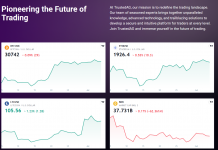 The world of cryptocurrencies has been buzzing with excitement as major digital assets like Bitcoin, Ethereum, BNB, XRP, Cardano, Dogecoin, Litecoin, Solana, Tron, and Polygon experience a remarkable price surge. This unprecedented boom is not just a momentary spike; it signals a potential seismic shift in the global financial landscape.
The world of cryptocurrencies has been buzzing with excitement as major digital assets like Bitcoin, Ethereum, BNB, XRP, Cardano, Dogecoin, Litecoin, Solana, Tron, and Polygon experience a remarkable price surge. This unprecedented boom is not just a momentary spike; it signals a potential seismic shift in the global financial landscape.
As these cryptocurrencies continue to soar, experts predict a staggering $30 trillion earthquake that will ripple through traditional financial systems. Investors, enthusiasts, and institutions alike are closely watching this big deal unfold, recognizing the transformative power of decentralized finance. This impact will be global and more details about worldwide crypto markets, you can check on coin insider website. The crypto market’s massive growth is set to redefine the future of money and investment on a grand scale.
What is The Current Situation in the Crypto Market?
The crypto market is experiencing a dramatic resurgence, with Bitcoin’s price surpassing $30,000 per bitcoin, doubling its value from late 2022. The recent upswing in the market can be attributed to two unexpected crypto flips that breathed new life into the industry. One significant catalyst was BlackRock, the world’s largest asset manager, making a groundbreaking move by embracing cryptocurrencies.
Elon Musk, the influential CEO of Tesla and SpaceX, also played a role in sparking a bullish prediction for the crypto market. His endorsement brought attention to the potential influx of $30 trillion worth of capital if the U.S. Securities and Exchange Commission (SEC) approves any of the recent applications for a U.S. spot bitcoin exchange-traded fund (ETF). This milestone could have profound implications for the industry, as it opens the door for financial advisors who collectively manage around $30 trillion in assets to invest in cryptocurrencies.
Eric Balchunas, an ETF analyst at Bloomberg Intelligence, highlighted the significance of ETF approval, saying it could act as a bridge to connect the crypto market with an immense pool of wealth. Even a small fraction of the $30 trillion under management by financial advisors would amount to a substantial inflow of capital into the crypto space.
The crypto market experienced a significant boost after Ripple, the developer of XRP, achieved a victory in a long-standing legal battle against the SEC. A recent ruling by a U.S. judge concluded that the sale of XRP on crypto exchanges did not breach securities laws, distinguishing it from Ripple’s direct sales to institutions and other entities. As a result, XRP experienced a significant increase in value, nearly doubling its worth and elevating it to the position of the fourth-largest cryptocurrency by market capitalization, surpassing Binance’s BNB.
After BlackRock filed an application for a U.S. spot bitcoin ETF, several other prominent financial institutions, such as Fidelity, JPMorgan, Morgan Stanley, Goldman Sachs, BNY Mellon, Invesco, and Bank of America, swiftly followed suit and submitted their own ETF applications. The comments of former SEC chair Jay Clayton implied that regulators could face difficulties in resisting the approval of a bitcoin ETF, especially as the spot market demonstrates similar effectiveness as the futures market.
The convergence of major institutional players embracing cryptocurrencies underscores the growing acceptance of digital assets in the traditional financial system. This trend has led experts and crypto hedge fund managers to predict substantial potential for growth as trillions of dollars remain untapped, waiting to enter the crypto space. The integration of institutional investors into the market represents a pivotal moment for cryptocurrencies, with the potential to redefine the financial landscape as we know it.
Why Will The Value of the Crypto Market Increase?
The future of the crypto market appears promising, with experts anticipating an increase in its value due to various influential factors. One significant driver of growth is the rising institutional adoption of cryptocurrencies. Major financial players and institutional investors are recognizing the potential of digital assets, with Bitcoin, Ethereum, and others at the forefront of their interest. As these traditional players allocate a portion of their assets to cryptocurrencies, it injects a substantial amount of capital into the market, driving up demand and prices.
Furthermore, cryptocurrencies are gradually gaining acceptance in mainstream finance and commerce. Increasingly, companies, retailers, and payment processors are integrating cryptocurrencies as payment options, expanding their utility and fostering higher demand for digital assets.
Decentralized Finance (DeFi) and the rapid expansion of decentralized applications (DApps) on blockchain networks like Ethereum are revolutionizing traditional financial services. DeFi platforms offer users access to a wide range of financial services without intermediaries, increasing efficiency and accessibility. As these platforms mature and attract more users, the entire crypto market is likely to experience significant growth.
Technological advancements in blockchain technology, scalability solutions, and interoperability protocols also play a crucial role in the market’s growth. Enhancing the usability and efficiency of cryptocurrencies by addressing challenges like transaction speed and high fees makes these digital assets increasingly appealing to users and investors.
Moreover, the limited supply of certain cryptocurrencies, like Bitcoin, creates scarcity similar to precious metals like gold. As demand for these limited-supply assets rises, their value increases due to the basic economic principle of supply and demand.
Furthermore, cryptocurrencies are gaining recognition as a safeguard against economic uncertainty and inflation. During such times, investors turn to digital assets as a way to safeguard their wealth, driving up demand and consequently, prices.




![Mayrsson TG Reviews: Why Choose Crypto-Trading with Them? [mayrssontg.com]](https://comparic.com/wp-content/uploads/2023/12/image1-218x150.jpg)













